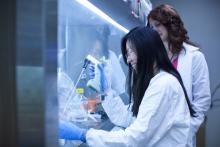UC Merced Professor Kara McCloskey was recently awarded a highly competitive $500,000 grant to continue tackling significant, unresolved issues in human stem cell biology, as part of an effort to enhance stem-cell research in California.
 This past month, the California Institute for Regenerative Medicine (CIRM), and its governing board, approved more than $27 million for Basic Biology V Awards, of which McCloskey’s grant is included. The leads for this center include Stanford University and the Salk Institute for Biological Studies.
This past month, the California Institute for Regenerative Medicine (CIRM), and its governing board, approved more than $27 million for Basic Biology V Awards, of which McCloskey’s grant is included. The leads for this center include Stanford University and the Salk Institute for Biological Studies.
In her UC Merced laboratory, McCloskey and her students are using stem cells to engineer cardiovascular tissues that could someday be used to repair damaged blood vessels or heart tissue.
Specifically, they are producing highly specialized cells that have not been the focus of much research to date – the endothelial cells found at the tips and in the stalks, including phalanx endothelial cells – of blood vessels, as well as cells that could help repair a damaged heart after a cardiac incident.
“The phalanx cells exhibit anti-inflammatory properties, and the ones in the tips and stalks contribute to angiogenesis – the new growth of blood vessels,” said McCloskey, who’s with the School of Engineering.
The two-year grant will help support her laboratory, including five undergrads, five graduate students and one post-doctoral scholar as they gather the data that takes them to the next step – building 3-D models of the vessels through which fluid can flow.
“Before implantation, we will first build and test the functional blood vessels to make sure they work properly,” she said.
Stem cell research has made huge strides since California made the research part of its constitutional right with the passage of Proposition 71 in 2004. But there are still issues with getting the human body to accept the new cells, even once the specialized cells are physically available to repair damaged and/or diseased cells and tissue.
Recently it was discovered that human induced-pluripotent stem (iPS) cells can be generated from mature cells in a human body, so eventually people should be able to donate their own cells to make the cells that could cure such diseases as Alzheimer’s, Parkinson’s and diabetes.
“If we recreate heart tissue that really works like native heart tissue, we might be five years away from human trials to replace damaged heart tissue in patients recovering from heart attacks,” she said.
But there are still many unanswered questions. The new Center of Excellence will focus on bridging the fields of genomics – studying the complete genetic make-up of a cell or organism – with stem cell research.
Other projects the CIRM grants fund are focused on creating brain and lung cells from stem cells.
This is McCloskey’s third CIRM-funded grant, including a New Faculty Award in her early pre-tenure years. The process of getting funding is very competitive, she said, and stem cell research is very expensive.
“I am very proud of Professor McCloskey’s achievements. I am confident that her work will continue to lead to important breakthroughs,” said Sam Traina, UC Merced’s vice chancellor for Research and Economic Development.
It’s not hard to recruit students who want to work in her lab, McCloskey said.
“Stem-cell research is really exciting because stem cells can, theoretically, be directed into any other kind of functional cell type, and now can even be made from mature non-stem cells in your body,” she said. “They have the potential to be anything. The students find that potential very exciting.”
Media Contact

